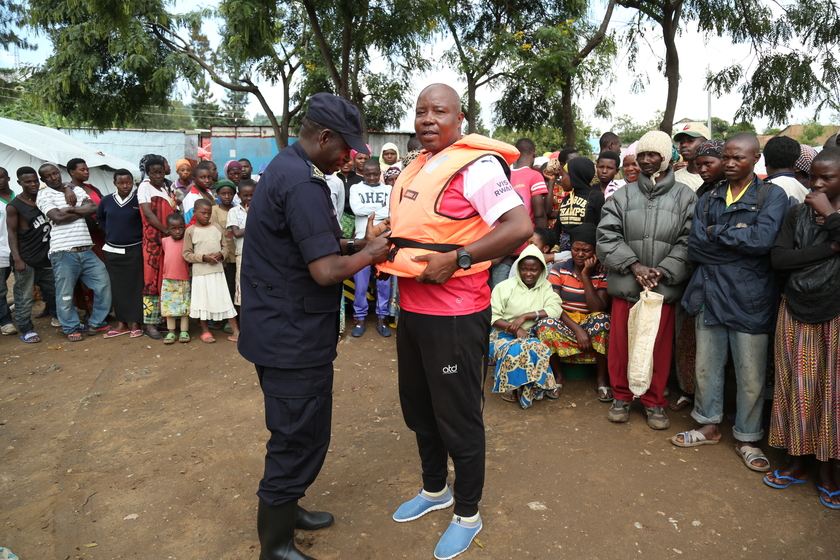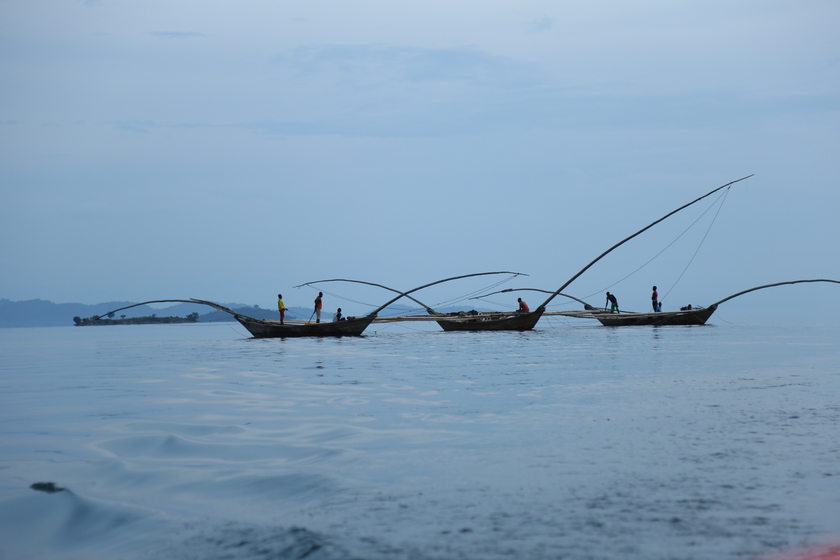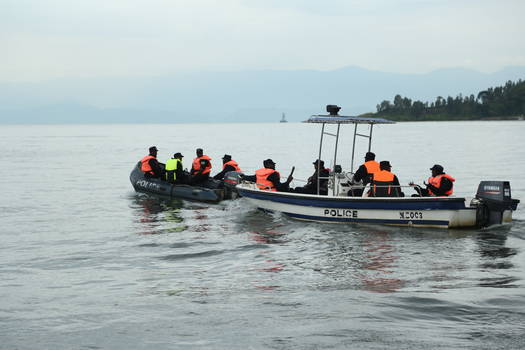RNP News
[PHOTOS]: How Police marine is saving fish stocks on Lake Kivu
At a glance from a vantage point of Rushyagara Village, on the hill overlooking this vast clear water body in Rubona Cell in Nyamyumba Sector, the waters of Lake Kivu are calm.
Lake Kivu is Rwanda’s largest water body, giving life to species of fish and other marine life and economically improving the lives of people who live around it.
Canoeing in groups of four boats, Rwanda’s fishermen spend every night out on the crystalline water searching for sardine fish, locally known as Isambaza.
Isambaza accounts for 60 per cent of the Lake Kivu’s biomass.
Some fishermen here use rudimentary methods of fishing, often harmful to fish stocks.
Among the methods deployed include the use of substandard mesh fishing nets and mosquito nets.
Fishing gears such as mono-filament nets, which are highly destructive if lost as they continue ‘fishing’, and beach seines, which are small mesh-size nets to catch immature fish have been identified as a threat to fish species.

CO marine unit, ACP Elias Mwesigye demonstrating to fishermen and neighbouring communities how to wear a life jacket.
In addition, methods like typhoon fishing (striking of water surface), the use of chemical attractants as well as poison are some of the other common illegal fishing methods used on Lake Kivu.
“The best net is the one that catches the most fish,” says George Minani, 47, as he stares into the lake where fishing boats dot the horizon.
He is responding to a question about the quality of his boat and the fish captured.
He is among about the 360 fishermen residing in the fishing village of Rushyagara. He has been fishing since he was a teenager.
Shared by Rwanda and the Democratic Republic of Congo, Lake Kivu covers a surface area of 2,370 km2, of which 42 per cent is within Rwanda’s border.
In Rwanda, it stretches 89 kilometres long, 48 kilometres wide and 240 meters deep. It is bordered by five districts of Western Province; Rusizi, Nyamasheke, Karongi, Rutsiro and Rubavu.
However, in spite of its nutritional and economic benefits to the surrounding communities, Lake Kivu also, sadly, has been a trap for some people attempting to evade laws, often resulting in loss of life.
The incidents, according to Assistant Commissioner of Police Elias Mwesigye, the Commanding Officer for Rwanda National Police (RNP) Marine Unit, are mainly attributed to use of dilapidated fishing boats, overloading and not using recommended safety fishing gear.
About 30 cases of drowning have been registered in Lake Kivu since the beginning of this year, according to official statistics.
“Over the years RNP has increased the capacity of its Marine Unit to sufficiently patrol our waters to protect fish stocks, passengers and fishermen,” said Mwesigye.
His unit keeps constant surveillance on the about 1200 square metres of Rwanda’s part of the water border, to enforce the law governing use and management of water resources, and the law relating to emigration and migration.
Currently, the unit has about 26 marine boats used in surveillance and operations in inland lakes.
“Our continuous operations are bearing results, which are mainly preventive in nature,” said Mwesigye.
At least 404 cases of illegal fishing have been recorded on Lake Kivu alone over the last six months, involving 163 poachers and 81 substandard boats.
Penalties or fines against such unlawful and dangerous fishing methods are also considered too weak.
The law determining the use and management of water resources in Rwanda, in its article 36, states that any person who uses or carries out water related activity without permit is liable to imprisonment of not less than three months and a fine of Rwf500, 000 or one of these penalties.

Police marine operations also prevents such unsafe fishing without life-jackets.
Overloading and people without life jacket attract a penalty of Rwf10, 000; and mixing people with goods attracts a penalty of Rwf10, 000 for small boats and Rwf50, and 000 for the big boat.
“Our operations are basically aimed at cracking down illegalities, to save fish stocks and lives of people on the lake. Basically, we enforce regulation to ensure the fishermen use standard nets, to ensure that all businesses in water bodies are done in a legal and safe manner,” said Mwesigye.
There are also several illicit and criminal activities associated with the fishing industry that are either unreported or unregulated, he says.
“That will occur when there is a breach of licensing requirements and conditions imposed on a license, fishing without authorization or license, over-fishing, fishing in a restricted area, using banned fishing gear and fishing during biological breaks (out of season).”
“We also monitor and prevent overloading of merchandise, fishing without life jackets and the rules governing the conduct of boat drivers on passenger transportation and cargo related dealings.
The Commanding Officer says joint efforts with local authorities and fishing cooperatives against such illegalities also contribute greatly in dealing with such illegalities.
“The fishermen are the eyes and ears in waters because they know the people engaged in such dangerous water businesses; their partnership has created impact,” says Mwesigye.
RNP gave financial support to fishing cooperatives on Lake Kivu, which helped them to acquire a standby motorboat. According to the fishermen, the boat has been vital in curbing any act of criminality related to fishing, drug trafficking, smuggling as well as responding to disasters on the lake.
Daniel Ndekezi, the president of Cooperative des Pêcheurs du Lac Kivu (COPELAK) says errant fishermen use gill nets commonly known as Kaningini, which are dangerous and kill even the uncaught fish.
“Together with authorities and Police we conduct regular sensitization campaigns among the fishermen and communities living near the lake on legal and proper fishing, we teach and show them standard nets and encourage more sustainable practices,” says Ndekezi.
The progressive ban on vending fish on basins and baskets, issuance of fishing vessel identification, registration of all boats, identification and gazetting of fish breeding areas are other measures being undertaken.
The national fish production from 24 lakes is estimated at 13,000 tonnes annually, with captured fisheries contributing 9,000 tonnes and aquaculture 4,000 tonnes.
Fisheries sector provides about 200,000 jobs, both direct and indirectly.

 English
English Kinyarwanda
Kinyarwanda
